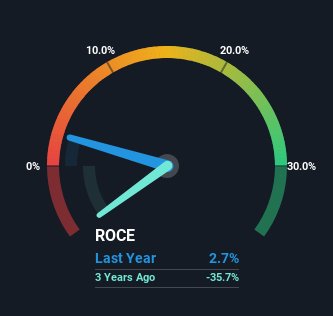- United States
- /
- Hospitality
- /
- NasdaqGM:TOUR
Tuniu (NASDAQ:TOUR) Is Looking To Continue Growing Its Returns On Capital
Finding a business that has the potential to grow substantially is not easy, but it is possible if we look at a few key financial metrics. In a perfect world, we'd like to see a company investing more capital into its business and ideally the returns earned from that capital are also increasing. Ultimately, this demonstrates that it's a business that is reinvesting profits at increasing rates of return. So when we looked at Tuniu (NASDAQ:TOUR) and its trend of ROCE, we really liked what we saw.
Return On Capital Employed (ROCE): What Is It?
For those that aren't sure what ROCE is, it measures the amount of pre-tax profits a company can generate from the capital employed in its business. To calculate this metric for Tuniu, this is the formula:
Return on Capital Employed = Earnings Before Interest and Tax (EBIT) ÷ (Total Assets - Current Liabilities)
0.027 = CN¥31m ÷ (CN¥2.1b - CN¥965m) (Based on the trailing twelve months to September 2023).
So, Tuniu has an ROCE of 2.7%. In absolute terms, that's a low return and it also under-performs the Hospitality industry average of 9.4%.
View our latest analysis for Tuniu

Above you can see how the current ROCE for Tuniu compares to its prior returns on capital, but there's only so much you can tell from the past. If you'd like to see what analysts are forecasting going forward, you should check out our free report for Tuniu.
What The Trend Of ROCE Can Tell Us
We're delighted to see that Tuniu is reaping rewards from its investments and has now broken into profitability. The company was generating losses five years ago, but now it's turned around, earning 2.7% which is no doubt a relief for some early shareholders. Additionally, the business is utilizing 68% less capital than it was five years ago, and taken at face value, that can mean the company needs less funds at work to get a return. Tuniu could be selling under-performing assets since the ROCE is improving.
On a separate but related note, it's important to know that Tuniu has a current liabilities to total assets ratio of 46%, which we'd consider pretty high. This can bring about some risks because the company is basically operating with a rather large reliance on its suppliers or other sorts of short-term creditors. Ideally we'd like to see this reduce as that would mean fewer obligations bearing risks.
The Bottom Line On Tuniu's ROCE
In a nutshell, we're pleased to see that Tuniu has been able to generate higher returns from less capital. However the stock is down a substantial 85% in the last five years so there could be other areas of the business hurting its prospects. Still, it's worth doing some further research to see if the trends will continue into the future.
If you want to continue researching Tuniu, you might be interested to know about the 2 warning signs that our analysis has discovered.
For those who like to invest in solid companies, check out this free list of companies with solid balance sheets and high returns on equity.
Valuation is complex, but we're here to simplify it.
Discover if Tuniu might be undervalued or overvalued with our detailed analysis, featuring fair value estimates, potential risks, dividends, insider trades, and its financial condition.
Access Free AnalysisHave feedback on this article? Concerned about the content? Get in touch with us directly. Alternatively, email editorial-team (at) simplywallst.com.
This article by Simply Wall St is general in nature. We provide commentary based on historical data and analyst forecasts only using an unbiased methodology and our articles are not intended to be financial advice. It does not constitute a recommendation to buy or sell any stock, and does not take account of your objectives, or your financial situation. We aim to bring you long-term focused analysis driven by fundamental data. Note that our analysis may not factor in the latest price-sensitive company announcements or qualitative material. Simply Wall St has no position in any stocks mentioned.
About NasdaqGM:TOUR
Tuniu
Operates as an online leisure travel company in the People’s Republic of China and Hong Kong.
Flawless balance sheet and good value.
Market Insights
Community Narratives



